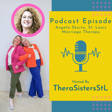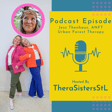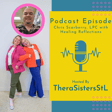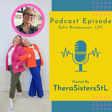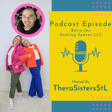Become a Creator today!Start creating today - Share your story with the world!
Start for free
00:00:00
00:00:01

Bill Leritz
TheraSistersStL talks with Bill Leritz, co-founder of Plural Healthcare, about the impact and importance of group work, which inspired him to open Plural Healthcare. We also discuss his definition of healing and hear some of his glimmers.
We have a fun question-and-answer portion that you don't want to miss at the end.
You can learn more about Bill Leritz and Plural Healthcare at Plural Healthcare . Check out this short video
As always, check out Amy & Katheryn at TheraSisters website or on Instagram
Recommended
Transcript
Introductions and New Beginnings
00:00:00
amycryan
Get in your seat. Hello, welcome to Thera Sisters. Hi. Oh, cast? Does it change? But it's good. Hello. I'm Katherine Barton. I'm Amy Ryan. Can you see me OK? Yeah. So today, well, first of all, Amy, what's going on? How's your summer? Summer's good. We're in my new space. Oh, that's right. New space. You can see it. Yes. Summer's good. It's hot. Yeah, it's very hot here. Yeah. You know, just learning to live with a tween. Oh, that just happened. I'm still sleeping. Maybe. Maybe. We'll see. It's almost 11 o'clock, so. How about you? Good. The transition into summer was a little hard. I don't know why. It just felt different. But I feel like we're on a good groove now. Summer camps are going well and staying busy and all that. Awesome. So yeah. Yeah. Good stuff.
Introducing Bill Larrick and his Journey
00:00:58
amycryan
I'm ready to bring in our guest. Yes, our guest is Bill Larrick. He is the founder of Plural Health and Health Care. healthcare care um You want to tell us more about? Well, do you want to come on in and then we'll say a little bit more? Come on in, Bill. Join us in our little corner. Yay!
00:01:22
amycryan
and have a yeah yeah
00:01:27
amycryan
i've never said but i think i'm goingnna be don worry it won't film you getting out of the poof cause thats you mar ah please film me getting
00:01:43
amycryan
So the information that you shared is you got your master's degree in social work from SLU, St. Louis University. yep um And you've been in mental health work. You do yoga. Oh look at you! You can take your shoes off too. yeah yeah It's comfy. yeah Sorry, I totally interrupted. This is how this goes. I'm quiet. You go. And you've been in health care for more than 25 years. it's nineteen you ninety Yeah, Yeah. And now you started your own business with the floral health care. So I guess just jumping in, tell us a little bit about what you're doing about floral health care. Do you want me to give you a little background on myself? Yeah. that yeah feast too um I was born and raised here in St. Louis. What high school did you go to? Oh, that's the question. we go sma jesuit high school okay
00:02:39
amycryan
judgments to and not the point of the question yeah yeah i went high school in illinois so i mean is i got away from oh gosh we're gonna even that you are exactly's straight so i grew up here in st louis um went to university of missouri columbia got a degree in psychology got a minor in sociology And then I went to St. Louis University, got my master's in social work. And then I graduated in 99, went and worked at a community mental health center called Adapt of Missouri, similar to Places for People, an independent center in St. Louis. They were located off of Hampton in 44. I actually met my wife there. nice um she was She was leaving to go work at VJC.
00:03:29
amycryan
So she trained me for two weeks and then I took over her caseload and then she called me up a couple weeks later to say, hey, how are the clients doing? And I'm like, wait a second. And then we went out on a date and the rest is history in regards to that. So i mental health has a wonderful place in my heart. So I worked at Adaptive Missouri for seventeen years oh wow i was the the director for fourteen years we served about five or six hundred
Founding Plural Healthcare
00:04:01
amycryan
clients that were low income individuals with mental health issues and substance use issues. And then I worked for a psychiatrist for about four years. And when he retired, I started Plural Healthcare in 2021, February 1st of 2021. Good job. And so what we do there, we do an intensive outpatient group therapy. And we also do individual therapy. The majority of what we do is intensive outpatient group therapy. And the individual therapy is with a Dr. Gary Becker. Dr. Gary Becker is a Vietnam vet. He's been a therapist here in St. Louis for 45 years. He works a lot with first responders, veterans, so it's very close to my heart working with
00:04:47
amycryan
first responders and veterans and that the trauma and it's not just veterans and first responders i i feel trauma affects every aspect of society, and yeah unfortunately, but acknowledging that is important in order to help get the heal. So yeah, I work with, so he sees people individually, and then we have two groups that I'm not sure, a lot of people don't understand what intensive outpatient programming is. Yeah, I was going to say give us a little... um So it's there's kind of like a a spectrum of mental health, like levels of care, and you have that, you know, I see a therapist, I see a psychiatrist, from medication management yeah
00:05:25
amycryan
and then on the other extreme is like residential care, yeah where i'm I go somewhere for 30, 45 days, whether it's for substance use or mental health. And that would be considered maybe also inpatient? Yes, don't know very much so. So that would be on the other side of the spectrum would be that residential inpatient type. And where we fall in with intensive outpatient programming is it's somebody who's really struggling having an acute
Services and Therapy Approaches
00:05:56
amycryan
issue and life whether it's a loss of a loved one, a divorce or just a life change or past trauma that they haven't dealt with or worked through um and they need something more than a therapist or a psychiatrist but they don't necessarily need to go inpatient. Whether it's acute inpatient just going in for 96 hours or something like that or residential little further up and it's it's my partner ryan cooper likes to say it's a booster shot for mental health
00:06:28
amycryan
yeah And so it's nine hours a week. It's three, three hour sessions of group therapy. okay um Again, the the people we work with, so we are a mental health IOP. So there are substance use IOPs, there's multiple substance use IOPs, Sonal Lake, Harris House, there's mini many of them out there, are a lot of good programs. it's just different one is focused more on the substance use piece The other, we're focused more on the mental health piece. okay And the mental health piece is, the people who come to our services are people who are struggling with, again, some recent trauma, grief and loss, depression, anxiety. We find a lot of individuals who are struggling, who are college age, university age, who are really struggling, just stress of yeah especially especially after covid yeah the transition yeah the stress of,
00:07:24
amycryan
feeling like they're themselves they this they need something where i love my therapist my therapist does a great job i have a psychiatrist certain certain respectition I'm getting the medications I need, but I just don't feel right. I need something more. It's like a booster shot. Right, booster shot for mental health. And so what we then focus on is it's three, three hour sessions a week and we try to keep the groups of eight people and less. And the reason for that is so much of the power of intensive outpatient group therapy, from my perspective at least, is that interaction with others.
00:08:00
amycryan
There's always a therapist, there's always a licensed professional in there who guides the process, develops the curriculum. A big part of it is people being able to say, I'm not alone. I'm struggling with this type of trauma. Now it might not be the same trauma. You're experiencing or you're experiencing or the depression you're experiencing or the grief you're experiencing, but I'm not alone. People are experiencing similar things. yeah And a big part of the group is understand you know that being able to relate to And part of it, maybe the experiences and life, the life experiences aren't the same, but maybe the symptoms or their emotional responses could be very similar. yeah And you can connect yes on that level. Right. And so we have two groups right now. And we have found one group. We we focus a lot on trauma, unfortunately, like that.
00:08:56
amycryan
in our in our culture so really focusing on trauma we do we we incorporate you know cognitive behavioral therapy, aspects of dialectal behavioral therapy, internal family systems, a multitude of of approaches. And it's about an eight-week program, so it's not meant to be something that's long-term. Again, back to the booster shot mental health. It's meant to say, you need something right now that's intense, directed, nine hours a week. again eight people or less because that community aspect's very important again not everybody's going to connect with everybody but there needs to be some commonality and part of the process is when we assess people making sure does this group make sense for you this specific group or this group that we're trying to create multiple groups to allow for you know as many addressing as many issues as possible but the reality is that a group therapy is only as good as the cohesiveness of that group yeah So they're closed groups, so they say it's the same people for the whole eight weeks? It is not. no No, it's people come in. So through that, so it's an open group. So that's a great question. And another thing that's great about that is, and a lot of it has to do with that intake process, assessing, create, what are your needs? Where do you fit? Do you not fit here? Would it be better if you're in this group?
00:10:24
amycryan
this group has older individuals who are struggling with midlife issues this group is struggling more with you know whatever that may be it you're not going to get the perfect fit yeah But trying to make sure, and one of the things, right now we have two groups. We're looking at expanding it, have multiple groups to ah you know accommodate as many people as possible.
Group Therapy Dynamics
00:10:43
amycryan
yeah And the reality, of as you guys know, you're both therapists, people only get out of it what they put in. So we're but it's very important. anything in life yeah
00:10:56
amycryan
anything in my face you're not if you're not so we get a lot of parents of adult children saying i really want my daughter i really my son to get into this service and i'm like that's wonderful i appreciate that but tuesday one right right And they need to be engaged. And one of the things that's important through the ah process when we do the initial assessment is, can do we feel we can help you? And we don't always know that yeah upfront. But also we don't want to set somebody up for failure. We don't want to say, unfortunately sometimes in in mental health from my experiences, we can do anything. We can help anybody. we can That's not necessarily the case. And if we don't feel we can help you, we have a lot of resources out in the community to refer. like You have needs that we cannot assist with.
00:11:47
amycryan
And if we cannot assist with you, then yeah we i mean we'd love to bring it in. But if we can't, we're just we're setting you up for failure. And it's not fair to anybody involved. yes especially And and our our our focus is the group dynamic, that milieu. It's so important to hold that because it needs to be a very safe space. And even somebody who, you know that if they're not engaged, it's a lot harder for me to express my deepest... concern in a situation not even if they're being aggressive or
00:12:22
amycryan
if they're not then what it creates is a situation of not trusting. And you can feel that, oh right? And if the other people are involved or even trusting to share too, like you said, if they're not super into it or like being authentic themselves, like you said, I'm not going to be authentic either. yeah Then we're all just kind of blocking and then it's not helpful. And that's the whole thing is to bring down those walls. Right, yeah. Or as much as we can. You know, you can only go so far with the set. And the group lasts about eight weeks. The curriculum is about eight weeks. And we incorporate, again, like I mentioned, all different types of modality. Mindfulness is a very big part of it. And it's open so you can have people who might be close to the end of their eight weeks, and then you have new people coming in. So you've got this maybe seasoned group member who can definite offer. Definitely. That's great. Yeah. it's a very good it's a veryary from that perspective
00:13:18
amycryan
i think that's very powerful because yeah you can have somebody that say but I'm coming into group and I am scared. I've never sought this out before. It's hard enough for me to admit I need the help. And now I've got to sit here with eight, six, seven, eight people strangers and then start talking about it. And if somebody can sit across the way and say, You know, I came here six weeks ago and I felt the same way. Yeah. Yeah. And guess what has happened? This has helped me. This has helped me. This, these are the tools I've gathered. These are the tools I've gathered. Versus like six newbies, right? Everyone's like looking at each other. Who's going to say something? Who's going to say something? Yeah. But it also injects new, you know,
00:14:05
amycryan
fresh perspectives as well it's not just the fact that somebody who's already you know kind of almost done with a program can impart their wisdom, so to speak. But it's somebody new coming in who just has a fresh idea that can spark that group. Yeah, that's great. I like it.
Tailoring Therapy to Demographics
00:14:21
amycryan
Yay. So 2021, right? is one Yes, start February of 2021. Okay. and it sounds So you're more focused on the mental health. Yes. And so lately, has it been more focused in trauma or is that your main goal is to help
00:14:37
amycryan
people who've been traumatized? No, it's it's there's just been more of a what we have realized is the more we work through the more we work with trauma is such a commonality. So one group might be have a little more emphasis on the trauma. Whereas the other group like we also work with like General Motors, we work a lot with general motors and people line workers okay and people who are stressed out burned out And not necessarily traumatized by anything, but very, you know, trauma. I mean, just, just burned out overwhelmed and overwhelmed by life. and you know the the work the work they do family life that's the other
00:15:17
amycryan
but that could be very different than somebody who's i'm at bo you i've had sexual trauma yeah and so it's that kind of so yeah we we have focused ah we focus a lot of trauma is a big focus but it's not the only thing we focus on we focus on we want to vote we want make the spectrum as big as possible. do ah sorry Do you also, you know, for people who might have certain diagnoses, is that also something that down the road you're thinking like a group for like people with bipolar or anything like that?
00:15:57
amycryan
we we're not specific to like bipolar per se um but it's more of like if there's a lot of people who are struggling with sexual trauma we have a group right now um it's only females and the majority of the females have had some type of sexual trauma doesn't mean You have to have had that to get into our group, but that is a unique group yeah and that we're addressing. And we don't want somebody who's not, with the best intentions, a 35 year old male is not going to create a safe space for them. But that 35 year old male has a lot of needs. It's just a different type of need. yeah And so we're trying to create that type of group. so
00:16:41
amycryan
we haven't pinned it down to like bipolar or like specific to anxiety or OCD or depression, but we're trying to make it like... So it's a little broader but yet focused. Yes. So the one group we have right now is a little broader and it encompasses more of the the variety of age levels and male-female and the other group right now is more directed towards females okay and sexual trauma
00:17:13
amycryan
okay well that makes sense And not again. Again, not specific to sexual trauma, but we we have found. Well, it sounds like you guys are really flexible yeah as far as like what is the need that comes and goes. Yes, and that comes from the assessment process. that's what so when we When somebody calls up, one of the things we really make clear right away is you want to help i said before but if we can't help yet but not going to tell you we can help and might benefit us from i'm a social worker by trade
00:17:47
amycryan
you're just a helper and some sometimes that's great and sometimes that bra i always trying to find your resources yeah right so it's
00:18:05
amycryan
my benefits they're right and they're from, exactly right in that and I'm saying, you say you can help everybody like I'm a social worker by trade. saying, it's not a good thing if you really can't. But one of the things we do at Plural Health that's so important is finding other people, therapists, psychiatrists, support groups, different other IOPs, whether it's substance use or DBT that's more like borderline personality disorder. A lot of personality disorders may not fit in some of our group dynamics because it's a very
00:18:40
amycryan
be problematic in a group it sometimes. sure yeah So just realizing we don't want to bring you, because the most important thing is, again, the group dynamic. Not that the individual is not important. The individual is very, very important. But it's very important to make sure the group feels safe, the group's cohesive as much as possible. If there isn't a good fit, then it won't work. Or it won't be as effective. It won't be effective for the group. And the reality is also, though, if we're not quite sure, We say, let's try it.
Patient-Centered Care Philosophy
00:19:12
amycryan
Let's see if it works. Let's see if it works. And if it doesn't work, here's these other services we can refer to. So a big part of what we do is looking for other resources in the community. but The reality is, in the field we're in, I almost say there's no competition. We're all wanting to help each other. There's so much need out there. And there's not enough resources.
00:19:37
amycryan
so i'd much rather get the right resources that we can refer to that can actually help you instead of just us saying we're the end all be all yeah We're going to take everyone and hoard them all. It's not respectful. Well, and again, there's so many different types of struggles that people have in their life. And yeah, I do think it's important that we recognize like, you know what, that isn't my forte or I'm not really good at that. And so reach out to this person because you also don't, I mean, you know, we don't want to give
00:20:11
amycryan
mental health services a bad name. ah you know like yeah It didn't help me. right but and well People are so hesitant to reach out etal services anyway yes yeah not as much as it used to yeah that all but it still is and there's a lot of resistance it's hard to ask for help it's hard to especially you're going to nine hours of therapy a week and it's just number one it's a time commitment or financial commitment and also you're vulnerable. yeah yeah layerable nine hours So the dirt while in your groups for that eight weeks, if they don't have an individual therapist, is that where, is it Becker?
00:20:57
amycryan
dr gary becker is one of our therapists okay see he He has the ability to see, but he he focused just, it's just almost a parallel track in our agency. It doesn't mean that we wouldn't refer somebody to Dr. Becker. His focus is a lot on first responders, veterans. I've always wanted to create a first responders group and it's been a very challenging thing because that's a population thats that doesn't reach out very resistant and it's unfortunate because because i think first responders need more help than anybody i know right now our population only every great day we working there's something
00:21:33
amycryan
yeah and peep and it's just hard it' hard to be a police officer a fireerfighter and to nine on one dispatch because you hear all this trauma and you're just so under the microscope so yeah that that we wouldn't prefer to dr becker so i'm not going to say that but one that's his his forte yeah his but and he used to run intensive outpatient group therapy so he's somewhat retired so now he just does individual therapy but we that's one of the things is finding therapists who we feel comfortable with another thing is
00:22:04
amycryan
in this world or at least in our community is there's sarah there's so many therapists and i'm not saying that they're they don't all have their benefits and their their upside but it's i don't want to give somebody a list of one hundred and fifty therapists right because that's just overwhelming and yeah it's not helpful. It's not like when you call your insurance company, great they have a list who's on the panel, but that that doesn't give you any sense of quality or needs. Or personality, what their specialties are. And so we really seek out therapists so we can create a very curated list of people we do, whether it's couples therapy like you do, um or just just whatever that may be, but also again,
00:22:48
amycryan
yes and we have some emdr therapists you know some are a lot more you know not harsh but just like you know just just like listen you need to do this and and other people are like other people need a softer touch so even within that finding out what they're the nuance of finding therapists so if somebody comes into our services they don't have a therapist and they especially if they're struggling with trauma we want to get it there start away right yeah
00:23:19
amycryan
like We do not believe that it's a successful discharge from our program if somebody doesn't have an individual therapist. So then in the side while they're doing that and if they don't have a therapist here over here looking like, who are my resources that I can refer them to, how can I help them get that? While they're in the program, not even after. not even not even waiting to discharge but no that's good seeing it because we consider ourselves a level. And if somebody does have a therapist and does have a psychiatrist, we never interrupt it. We don't want to say you need to change therapists or you need to change it. If it's working for them, good. yeah We want that. you want it If they're comfortable with us communicating, we want to communicate. That's a great support because I know that throughout my time I have had clients
00:24:09
amycryan
who have um had moments of crisis that was a little bit more um heightened, right? And they went into ah you know a big hospital out intensive outpatient program. And it wasn't as individualized, right? It wasn't as, I mean, they got benefits, um but it was pretty much like each one that would come back, it was pretty much the same formula in a way and it was helpful, but what I'm hearing from you is a lot more individualistic. very There is this more community because I remember hearing like the age ranges and the things that people were dealing with were really different spectrum. So it was hard for them to kind of open up really about themselves and and their personal struggles and to be vulnerable. so
00:25:02
amycryan
when you're offering is really, I'm feeling the need that is missing in our communities.
Therapist Adaptability and Scheduling
00:25:09
amycryan
And those in those hospital systems, I'm like i'm not having, I don't have anything. when i'm not and I don't But yeah, but but but it's very important to individualize it as much as possible. so yeah And to really meet the need of the individual when they arrive in Our services, we're here to, I mean, our therapists will literally change programming halfway through the group because the group needs something different right now. sure sure There's three members who are really struggling with boundaries with a significant
00:25:46
amycryan
for whatever or whatever that had this system well okay and they' huddle up at have you know at at halfway through we always take a break and we'll come back and like They'll change the whole approach. So how many therapists do you have working in a group? we have too well no it's they they They work individually, oh okay but right now our groups are both at the same time. okay So they're at just yeah they're Monday, Wednesdays, and Thursdays from 12pm to 3pm. And we used to do an evening group, and we're going to look at doing that again, but we've found the majority of people who come into our services either are taking a leave
00:26:24
amycryan
or or would and if they are taking a leave of absence, which I recommend if you need this intense therapy, and it doesn't work for everybody, so i don't it's not required. But the last thing you want to do is, I'm taking a leave from work, I have young children, I've got to come to a 4.30 to 7.30 group yeah right during dinner time. right right If I'm already taking a leave, I'd much rather do it during the day. yeah and so yeah so So it's very individualized. um we also do work with psychiatrist Dr. Meredith Troupe. She used to be the medical director of places for people. She works at ARCA now and does a private practice. And then she collaborates with Connor Young, who's a nurse practitioner. I have known since, wow, mid 2000s. She works at the VA and she sees clients. So if somebody needs, so when if somebody, not everybody needs medication management who comes in, a lot of times you will need a referral from a doctor.
00:27:25
amycryan
for this higher level of care. okay And so they we always offer that. If they have a psychiatrist, again, we don't want to interrupt that care at all. But if they don't, then while they're in the program, they see that psychiatrist or nurse practitioner, and they can... Oh, so they need that maybe authorization for insurance or something of that nature, is that what you're saying? Yes, that's correct. coffee from he gives a you very much i appreciate that's so you looking for
Founding Inspirations and Team Building
00:28:02
amycryan
and What was it in your career that I mean it sounds like you've you know Stayed at places for a long time and you've worked and seen how groups can really be beneficial but was there anything in particular where you're like this is my calling or This is my focus to really like to start plural That's it that's a good question no Actually, it was my my boss says, I'm retiring. um And I knew, I knew. But what it's interesting because in in my when I started, when I got into this field, again, at Adapta Missouri, it was very you know low income case management work, not a lot of group work. There's something called PSR. It's like a social rehabilitation center. It's like clubhouses, like independence, et cetera. But they're more, the groups are more life skills type of thing, ADL type of thing. It's not it's not something, it's intensive outpatient group therapy. yeah So it was somewhat new to me. And so when I went to in 2016, when I left the ADAPT,
00:29:18
amycryan
and what more for the psychiatrist i was introduced and I knew about Intense About Patient Programming, but I didn't know a lot about it. I just saw how powerful it was. and My partner, Ryan Cooper, who I met at the time, and he he was very he he was dealing with he was working with the outcomes. and you know Another thing we do, it's it's very important when people come into services, we do the PHQ-9, we do the short-scale, we do the G-87, we do a lot of scales, Columbia Suicide Assessment, because we want to see, we want to show from an objective perspective how much we're affecting people's lives, not just from a subjective perspective. And we just realize, wow. It's just powerful for the clients to be like,
00:30:05
amycryan
Well, this does work. And people don't always see it. Right. They don't always see it. And one of the things about our groups also is we bring in family members because once a month to to have a family group because a lot of times people are doing all this work And then either the spouse or the significant other or the family member may not notice it or they do notice it, but they don't always communicate. They don't know how to go around it. Change even in a good way. It changes everything.
00:30:35
amycryan
yeah yeah yeah So yeah, just just realizing that. so So when I was working for the psychiatrist, I just saw how powerful intensive outpatient therapy was. So when he did say I'm retiring, I looked at Dr. Gary Becker, who was then running our intensive outpatient program there, and he was often doing individual therapy. I said, would you be interested if I started a company and doing this? And he says, yes, I would. Awesome. And so we started that. and then Because the psychiatrist was retiring, You're like, oh no, this is going away, this service. yes yes and And there's fair everybody needs to yeah there is very few. There's very few mental health. There's start there's more coming in right now. There's there's definitely some more agencies there.
00:31:18
amycryan
coming on board for mental health but iot but's very rare, which is really unfortunate because I think it's so, so needed. So we started to do, so we developed this and then my partner, Ryan Cooper, who used to work at intent Millennium and Integrative Health with me, with the psychiatrist, then we he says, I'm interested in yeah getting back, and he he's very good in business development and more of the business side of it. yeah Again, like I mentioned, I'm a social worker,
00:31:52
amycryan
right but he brings he brought a lot, but he also, I mean, having worked in the field, he's very well versed in mental health now as well, but we kind of joined forces, and then we started working. there's there Our therapists are Emily Bellarta and Hannah Baker Boyd, oh And they they both used to work at DePaul. And I had worked with Emily because she would, if Dr. Becker was out on vacation, she knew doctor the psychiatrist we worked with. And so she would kind of sub in. okay And then we talked to her and she's like, would you be interested in making a change? And then she came on and then she brought in Hannah and Emily's just, I mean, she is, i I've never met anybody who runs better groups than her. all bias yeah
00:32:39
amycryan
but she's still its a specialty you know she's actually writing a book on And stuff good she's just very, and they're so creative. They're so creative in how, how they, you know, again, they on a dime, they'll change the curriculum. They're very well, well versed in this. yeah hey And tuned to it. Yes. Yeah. Nice. So, okay. So from the psychiatrist working there kind of inspired you. Right. i real i just realized this service
00:33:11
amycryan
was just I didn't I knew it existed but I didn't know then it wasn't pervasive at all and I'm just like this is a word incense yeah awesome yeah we're looking at expanding that. okay good And then we're looking at doing other types of support groups, like I'm working with ah another client, a lot of a lot of police officers that we work with. One is wanting to do a support group for other police officers. and mean like You can use our space. So it sounds like when you do these assessments on some level, they are the inspiration of maybe an upcoming group.
00:33:50
amycryan
Yeah. And like, what's it mean out there? I mean, to the credit of our therapist, Emily and Hannah, it's like, you realize we're turning, we're turning people away because they had needs we couldn't meet trauma-based. And I'm like, why don't, and then they took it, Emily took a training on internal family systems. It's a wonderful, I don't know how well versed, I was not well versed. Not that well versed. I wasn't either, but wow.
00:34:21
amycryan
And we're like, why don't we expand our curriculum to really focus more on trauma? So that's an example. awesome Yeah. Instead of saying, I mean, if we instead like we can't do this, we can't do this and instead. You're like, let's learn how. Yes. And realizing we don't know where to send you. Oh, right. Oh, yeah. Right. There aren't really. is it Yeah. Not a lot. There's not a lot. It's very limited. So there is a need. Why don't you answer it? To your point, yeah, as we see what are the needs, we will continue to expand. That's awesome. And then and then we take and then just the we take all most major commercial insurances. Unfortunately, we're not able to use Medicare or Medicaid because we're not affiliated with a hospital, which is a
00:35:09
amycryan
rule, which I don't understand it, right because I would love to do a group that worked with Medicare and Medicaid. So we we do all major insurances, and then we also do self-pay. And again, we're we are the type that we, like Ryan and I are just like, oh my God, sometimes are we good businessmen? I don't know, because i want like we want to help people. So yeah we really make we make it a point to say, We want to bring, if you need us, we want to get you. We want to help you. Yes. And so then do you offer grants or do you find people to? So we do a sliding scale. So we do a self pay and then we do a sliding scale. A lot of times it comes down. We do not do grants because we're not a for profit. So we're not able to do grants. There's grants out there, but that's not something I mean,
00:36:07
amycryan
That's not part of the business, no.
00:36:12
amycryan
But yeah, so but we do work with people who do not, if they don't have, like we have a person right now, it's just like, i can't I can't afford this. And she came back industry and she needs it. And whi not that we can accommodate everybody. We're very honest with that. Another thing that's very important to us is when somebody comes in and we do the assessment, we tell people this is what you're going to owe one of the things that has really so i've struggled with and my partners struggle with is is it that you go buy a car, you know exactly what you're gonna pay. You go to a doctor, you don't know a lot of things. You have no idea what the other doctor calls this. Yes, and you just don't know. Until you get the bill. And then you get the bill, and you get the EOB. They changed that. There's that new, what is it called? It's a law. It's called something, right? I have it on my paperwork. For people in range where you're supposed to know what the whole bill is. Yeah, yeah, yeah, Sunshine. Not Sunshine.
00:37:09
amycryan
I know what you're talking about. Yeah. Yes. Yeah, I have it too, but I forget. Sorry, we don't know. We don't know, but we can look it up. Well, and to continue just with our theme, with our podcast too, I'm curious.
Cultural and Spiritual Insights
00:37:24
amycryan
um we always We always ask about healing. We always ask our guests, how do you define healing? How do you define healing for yourself and for the people It's a good question. Healing is so important. yeah I mean, it's, to me, healing...
00:37:42
amycryan
i was very fortunate many many many years ago back in about 2001. Well, first of all, just growing up. my My parents, I grew up in the Catholic Church. I'm not necessarily a practicing Catholic at this point, but it gave me a lot of empathy and social justice yes tooth to things. And my parents also loved to travel. So they were this, my dad's always like, and and they loved to travel. My parents say they're frugal, they're cheap. but Because they have to pay for the next trip. they But they always like, I'm not going to get you a bike, but I'll take you traveling. And we'll travel the world and the country. And we'll stay in hostels, youth hostels. and And I learned quickly that human beings are so much more similar than that. And seeing other cultures is just a wonderful thing in it. And I know that's not specific to healing.
00:38:37
amycryan
but it's specific to the fact it just the common human experience that we have and so to me you know healing is you know it's kind of a cliche the mind body spirit type of approach and I think what we have lacking in our culture more than ever is that spirit communal gathering dimension yeah of it and realizing how much more people are similar than they are now and i feel like we have such a ah disconnect especially with social media and just people, it's like we're connected more and the less connected more than we've ever been. yeah It makes a lot of sense of your fit with the groups, yeah yeah that being such a huge healing thing, your beliefs around that. And so i so as I grew up and then I went to, it like I mentioned, I went to a Jesuit high school and ah Jesuit, it's it's called Men men for others it's All about service so It's all about servicing other people. It's all about giving of yourself. How do most people who graduate from this might do that, unfortunately? No. I'm not i' not a saint. I'm not claiming that i' I'm this Chinese person or anything whatsoever. um But I just think so much about, and then and then in 2001, I had met a gentleman. His name was Lama Wapsing Paul. and he was a tibetan monk and and i got into buddhism i learned about yoga
00:40:03
amycryan
breathwork, meditation, and music. I mean the incorporation of music into it. We've talked about music. I mean just how important music is and how important there's so many of these aspects of life that we don't incorporate enough for our healing. And they don't, a lot of it doesn't cost anything. Yes, yes. Like listening to music or dancing. So what I'm kind of gathering is this one spiritual piece or connection with others but maybe even a spiritual connection within ourselves right like just this energy that we can create or bring into ourselves with like music or yoga or mindfulness and meditation this kind of and most importantly connection again coming back to the group yeah yeah in buddhism there's the three jewels in the Sangha. And the Buddhism, like, more on the Dharma is kind of the way in which to, you know, live your life to be a fulfilled life. And the Sangha is the community. And the community to me, I have a group of friends who meet every Friday or most Fridays and do yoga together at six o'clock in the morning. So that's part of your healing? It's very big part of my healing. And I think that communal aspect is so missing in our world.
00:41:27
amycryan
And doing things like that, kind of in the spiritual way, together. And when I say spiritual, spiritual can be a loaded word. I don't mean religion. I don't mean anything, nothing about organized religion. It's just the ineffable of our life. You know, there's like music has an ethereal quality. yeah you know there's aspects of life that you can't just scientifically, you know, charge. And thank goodness. i oh my goodness ah rous go short yeah My daughter says, hey, can you help me with math? I could never go early to school. no no no we cannot right But we know our strengths. right we know our strength so So from a healing perspective, so through
Breathwork and Healing
00:42:10
amycryan
that,
00:42:10
amycryan
i learned again through yoga through breath work and that type of thing i think breathwork to me is one of the most important things, the healing. And again, as as Andrew Weil, the big old white beard, he was a Harvard educated doctor, he wrote a book about all about breathwork. And he says, it's free. You have all the tools. You have all the tools. And he said, people don't know how to breathe. And you don't know how to breathe deeply yeah and how it what it how it affects every aspect of your body you know activating the parasympathetic nervous system
00:42:45
amycryan
you know instead of sympathetic fight or flight and so those all those aspects of life I was and then when I was right when I graduated from college I moved on to Arizona for a year and I was working but I was working as a pizza hut delivery guy and I was working for a psychologist and the psychologist the the assistant she told me about a guy named Joseph Campbell because he knew who Joseph Campbell is but he's a comparative mythologist he's he was around from the
00:43:17
amycryan
early 1900s until 1986, he passed away. But he just taught all about you know spirituality and and about the commonality of humanity. He says most religions think they're different. like every Almost every religion has the virgin myth, the flood myth these myths and about how it helps you and how mythology and that not mythology in the sense of a falsehoodda unfortunately people see mythology as a falsehood but It's how a story in a way. It's a story that's macro and it described in every culture describes your kind of whole culture and that helps guideger guide your community through your laws and how you approach life. But to me, most importantly, it helps the individual work through life experiences.
00:44:07
amycryan
had a time where, you know, when you were 13 or 14, you had a transition from childhood to adult and there was a ritual that meant something that actually resonated. And some of that has, yeah, there's some cultures that still have that, thank goodness. It's usually thin now and there's just individuals who are just lost because they don't have that grounding or that transition or that acknowledgment of that transition that they can be proud of or celebrate.
Community and Healing
00:44:43
amycryan
When I learned that back in 1996 when I I mean, he was just, he had a really good approach and it really helped me. And it led was a me to, you know, yoga, meditation, and just community and the important. To me again, it's that community that's so important and so lacking. Like, there's like situations like this. Yay, community! Yeah, it's a wonderful way to
00:45:15
amycryan
communion. I mean, you had mentioned when you kind of said it, like, what's a glimmer? Yeah. Well, what's a glimmer to you? I'll tell you, a glimmer is how much hope I have in meeting people like you and meeting people just in our community who are really looking and seeking to help heal each other and themselves. I like that. I like that. Where people can be glimmers. Yeah. So we're glimmers upon each other. And the more you have glimmers, the brighter everything gets. I like that.
00:45:47
amycryan
do yeah That brought you to another big piece of our podcast, which is we always ask, what is a glimmer? What's a recent glimmer that you've noticed? And so that was perfect. It's exciting, though, because it is. Because I think it's so easy with the news and social media. It's just so easy to see the negative. To not And not connect, or reach out, or find that community. Right. Or think it's not even there, maybe? A lot. of people don't know it's there and that's one of the beauty of like like plural health care that's a two-door-on-horn but it's seen that small little community of eight people
00:46:24
amycryan
yeah and Guess what? I'm not alone. yeah I do have hope. I have the ability to affect change in my life. But not just in my own life, it's that whole idea of service. You have that baton, now you're... yeah you know One of the things about and Buddhism is when the Buddha found enlightenment, he says this can't be taught. And they said, no, you've got to go back into the world and teach it. because it's not You can't. and then he realized no you can yes but you can't teach it in a sense that i can make you see like i can give it tools and and that's what they're yeah
00:46:59
amycryan
yeah yes yeah not saying i've got to guide you I've got to guide you to the you know the solution. I need to give you the tools so you come to it on your own. Because that's where the power lies, is when you come into it on your own, but also with that support and being challenged. The challenging part, a lot of times in our field, is being just kind and nice and just saying, oh, everything's going to... And it's hard to really look in the mirror. yeah yes it it's I can be nice at the same time. Have you thought about this? Did you notice this? and That's the challenge. Well, and the challenge here is we have so much talk about. I feel like we could talk for a whole other hour and I looked at the time. And we still want to draw our little question out of the bowl. ohly So these obviously are all new. I've never
00:47:53
amycryan
She doesn't even know what they are. You pick one and then we all get to answer it. yeah Read it. Ain't just one. yeah So who knows what's in there? Who knows? What's your most prized possession and why? Oh, okay.
00:48:09
amycryan
possession prize possession Ooh, that's a tough one.
00:48:13
amycryan
inside
00:48:18
amycryan
um are straight to family, like as opposed to something that I hold or something physical. um Not that being a possession. Well it's like something that... sisters challenging you i like pay for Well that's just where my mind went first because I wasn't thinking of something like that I would hold. yeah but i was also thinking But I was also thinking of the challenge of family too, in the sense of keeping up those relationships and the work that it takes and the
00:49:02
amycryan
the community and communication that's needed for all of that. So maybe that's not a prized possession. Sorry, family. Sorry. I don't know. If you're looking for something else. Forget the family. Forget the family. You're a stump affair. That's a prized possession. Yeah. I mean, I guess I could say, if we're going to do a tangible thing, I think if there is a fire, What would be some of the things that I would want to grab? See, I would grab my family. Well, the science of family, but if we're talking about... But maybe like the two things that popped in my head were my wedding ring and then pictures, like photo albums, I think would be
00:49:53
amycryan
because I think what they represent is family. And the commitment I have with my husband and the love that we have and then you have the memories and all of that. So that would be my possessions. yeah Now it's on you. Chris, did you really answer the question? She did. She didn't. She she evaded it. Wow. She did.
00:50:18
amycryan
I'm so confused.
00:50:21
amycryan
um I love books. I love, love books. To my wife's dismay, not dismay, but I just have so many books. Do you have a lot of books? I have got books and I just love the look of books. Do you have a favorite book? i know okay well gift ah my favorite book of all time is east and een by john stein okay it's by far favorite book well Yeah, that's one. see its There's another book called Shaboomie that really had an effect on me that made me appreciate the whole boss culture, but it's a whole different. okay And um i've i've I have a singing bowl that I've had for many years and it's got this resonation so beautifully and i use it so tape on a regular basis. So that singing bowl in the slalom of St. Paulton that I've mentioned that I've known since 2001, he blessed it. He was very much like, this is a very a very beautiful and spiritual thing. and It's always resonates, but books probably. And I can't. Would you grab them if you if there was a fire? I couldn't grab them. My would be throwing in No, she loves drinks.
00:51:48
amycryan
I just love the idea of books, even. The thing is, it's like, that's my favorite book, but my copy's not that it. I have gorgeous old books that I just love. yeah So they're more, just more aesthetically, more so than even the content, but probably books are bad, and something like that. like that Are you going to answer? No. Well, if you put it in the context of what would you grab if your house was on fire, like I'm like... So you leave your family. right You leave your family. I can't think of anything in my house that I would be like, I have to go. Like, I don't know where my, I know where some of my pictures would be, but I'm probably burn up trying to get them. um
00:52:29
amycryan
But I guess I was thinking maybe my car because it takes me places, it takes care of me. It's something that I'm buy paying for myself and something, you know, like empowering. Yeah. It gives me freedom. It gives me, you know, I don't know. Does that count? Yeah, sure. It's not in my house, but I don't have to grab it. You could drive your family around. Yeah, exactly. Away from the fire. See what you incorporate. Oh, well, good. This so I learned so much about you today, Bill. I really appreciate you sharing all of it. I'm happy to do it. Thanks for having me. Sure. Is there anything else you want to promote with like anything special happening up at Plural or?
00:53:20
amycryan
Um, nothing specific. I mean, again, we continue to develop our groups. We're going to continue to, you know, we want to get the word out as much as possible because we want to help people. um I also work for a place called the Kauffman Fund, or I volunteered this for the Kauffman Fund. And they work specifically with veterans. And so I'm hard part of the Mental Health Collaborative. I've talked to you about this. yeah um So we're we're trying to expand services for veterans. as well that's not specific to my company i mean plural health we're continuing to just
00:53:52
amycryan
push you know it we want to get the word out because people do not i don't think people appreciate and would appreciate i don't think they know about the service right Even people in the field. And if you would have asked me before I went and worked for the Millennium Integrative Health after ADAPT, I'm like, I didn't, I mean, I knew of it, but I didn't know much about it. So I think it's one of the things is getting that word out that there's help. And again, my my partners, or one of the things that I really like is, and I sent this to you guys, I think it was last night,
00:54:24
amycryan
with that video oh yeah and it really has a good description and i think captures and I have my partners yeah who put this together and I just think that really captures the spirit yeah of what we're trying to do. And it describes it really well in a very digestible way of like, oh, now I know what that means and what it actually looks like and what it offers. So yeah, no, it was good. Yeah. We'll add the link to that video. Oh, wonderful. Yeah. And so real quick, where do they find you? Is it like pluralhealthcare.com? Yeah, it's pluralhealthcare.com.
00:55:02
amycryan
so yeah on there you can find everything ah about us. And if somebody wants to refer somebody or refer themselves, they call the number, the 314-388-2225, it's on the website. um But yeah, and then what we do is if somebody calls, we do a very brief screening right off the bat. we One of the things that we're very conscientious of is we don't want people to have to tell their story over and over and over. it Especially if you're dealing with trauma yeah um and just those traumatic situations we don't have to people telling their short So we do a very brief you know assessment to say, do we think we can help you? We check their insurance because one of the things we really want to make sure is it affordable. It's one thing to know. This is going to help me, but if I can't afford it, then we don't want you to go down this path. sure And then we did we get you in with a therapist to do the initial assessment
00:55:54
amycryan
right away One of the things also about Intensive Outpatient Program is you usually needed it yesterday. yeah You don't need it in six months. therapy fair fair up yeah But so we want to get people in as quickly as possible. So we make ourselves as accessible. Yes, very much so. We can get people in within a couple days. oh wow okay ah right plural health bill la layer
00:56:25
amycryan
thank you and we have to get out of the poop yeah I don't know. i don't know i it definite
